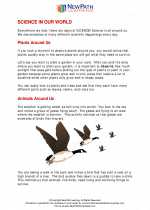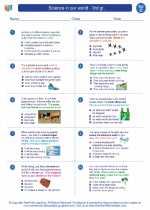Fossilization
Fossilization is the process by which the remains or traces of ancient living organisms are preserved in the Earth's crust. This process allows scientists to study the history of life on Earth and understand the evolution of different species over time.
Process of Fossilization:
The process of fossilization typically involves several stages:
- Death of Organism: The organism dies and its remains are buried by sediment or other organic material.
- Decomposition: Soft tissues of the organism decompose, leaving behind harder parts such as bones, shells, or teeth.
- Permineralization: Minerals from the surrounding sediment seep into the remaining organic material, gradually replacing it with minerals and turning it into a fossil.
- Compression and Cementation: Over time, the layers of sediment above the fossil exert pressure, compressing the organic material and turning it into rock. Minerals in the groundwater may also fill in the spaces within the fossil, further preserving it.
- Exposure: Erosion or human activity may expose the fossil, allowing it to be discovered and studied by paleontologists.
Types of Fossils:
There are several types of fossils that can form through different processes:
- Body Fossils: These fossils preserve the actual remains of the organism, such as bones, teeth, or shells.
- Trace Fossils: These fossils preserve traces of the organism's activity, such as footprints, burrows, or feces.
- Mold and Cast Fossils: These fossils form when an organism's remains leave an impression in sediment, which later hardens into rock, creating a mold. If the mold is later filled with minerals, it forms a cast fossil.
Study Guide:
To study fossilization, it's important to understand the following key points:
- Describe the process of fossilization and the different stages involved.
- Explain the difference between body fossils, trace fossils, and mold and cast fossils.
- Discuss the importance of fossilization in understanding the history of life on Earth and the process of evolution.
- Identify different types of fossils and provide examples of each.
- Describe the role of paleontologists in discovering and studying fossils.
Understanding fossilization is essential for understanding the history of life on Earth and the process of evolution. By studying fossils, scientists can gain valuable insights into the diversity of ancient life forms and the environmental conditions that existed in the past.
.◂Science Worksheets and Study Guides Third Grade. Science in our world - 3rd gr.
Study Guide Science in our world - 3rd gr.
Science in our world - 3rd gr.  Worksheet/Answer key
Worksheet/Answer key Science in our world - 3rd gr.
Science in our world - 3rd gr.  Worksheet/Answer key
Worksheet/Answer key Science in our world - 3rd gr.
Science in our world - 3rd gr.  Worksheet/Answer key
Worksheet/Answer key Science in our world - 3rd gr.
Science in our world - 3rd gr.  Worksheet/Answer key
Worksheet/Answer key Documenting Data
Documenting Data 

 Worksheet/Answer key
Worksheet/Answer key
 Worksheet/Answer key
Worksheet/Answer key
 Worksheet/Answer key
Worksheet/Answer key
 Worksheet/Answer key
Worksheet/Answer key

The resources above cover the following skills:
History and Nature of Science: A student should understand the history and nature of science. A student who meets the content standard should:
Develop an understanding that historical perspectives of scientific explanations demonstrate that scientific knowledge changes over time, building on prior knowledge.
Develop an understanding that scientific knowledge is ongoing and subject to change as new evidence becomes available through experimental and/or observational confirmation(s).